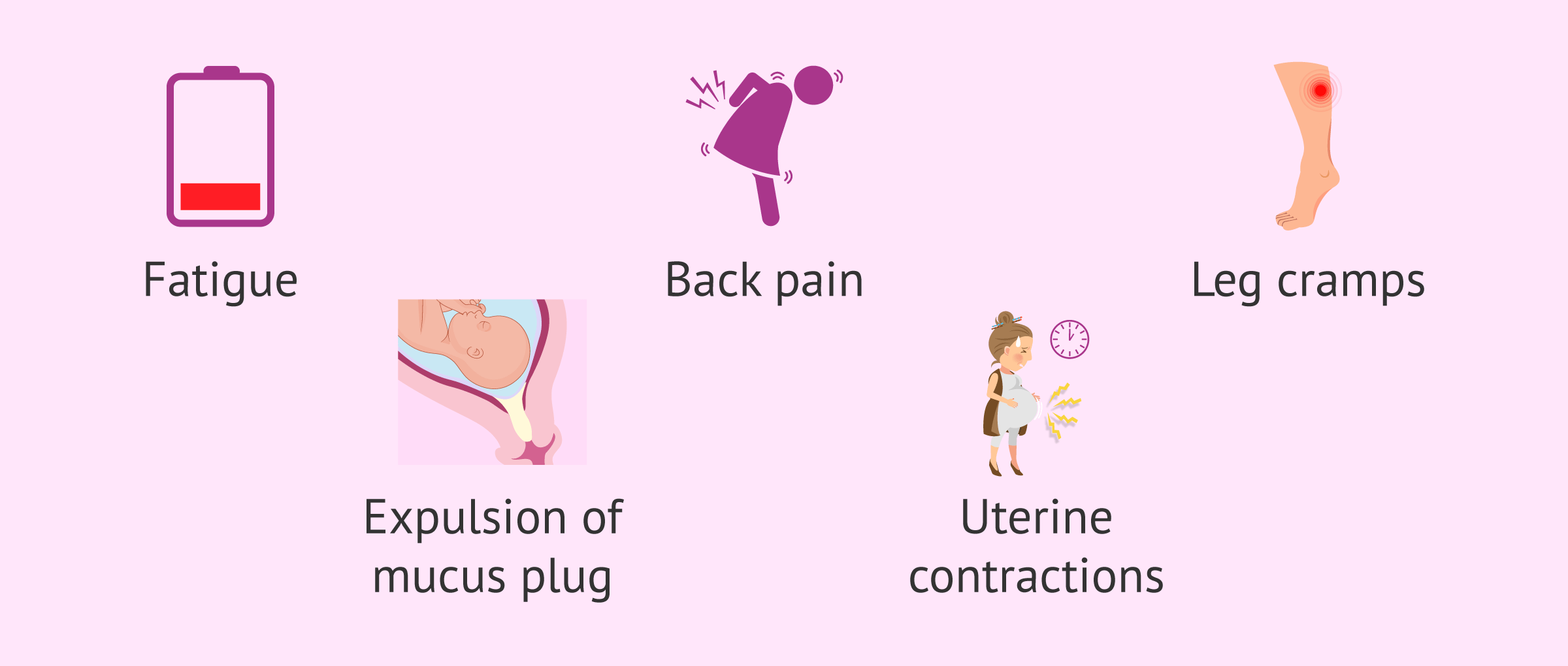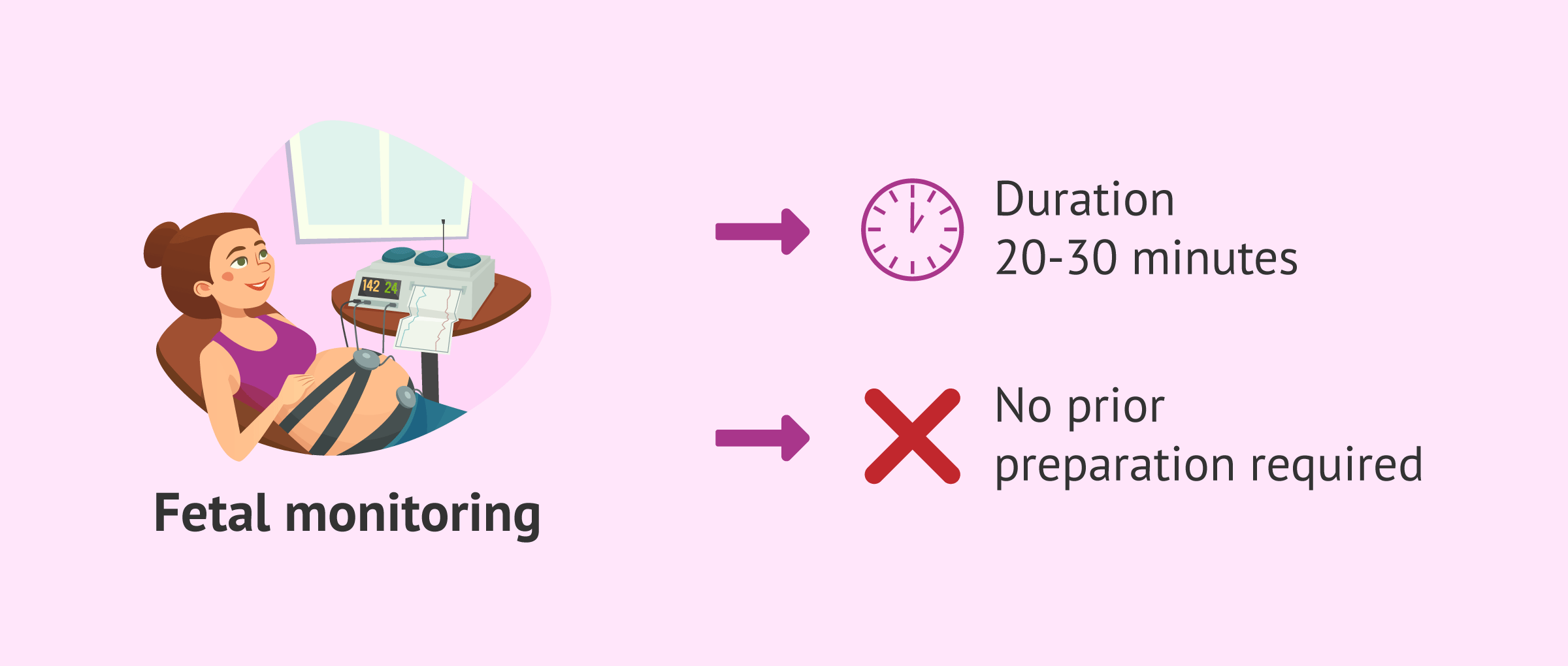Pregnancy is coming to an end in the 40th week of pregnancy. On the one hand, this gestational week is a time of fear of childbirth and fears that something might go wrong and, on the other hand, excitement of being able to see the baby's face. Therefore, this week must be enjoyed, as it is a unique and special moment.
Despite having an expected delivery date, it is true that the time of birth may be delayed. Generally, if delivery has not occurred by 42 weeks gestation, then it will be induced by physicians to avoid possible risks to the baby.
At the end of this 40th week of pregnancy, the baby is about 48-51 cm long and weighs about 3,400-3,640 grams on average. If the baby's weight is between 2,920 and 4,100 grams, there is no need to worry, as it is within the values considered normal.
Provided below is an index with the 7 points we are going to expand on in this article.
- 1.
- 2.
- 3.
- 4.
- 4.1.
- 4.2.
- 5.
- 6.
- 7.
Measurements of the baby at 40 weeks of gestation
The gestational period is almost over and the only thing missing is the moment of delivery. At this instant, the size of the baby can be compared to that of a watermelon. A baby in the 40th week of pregnancy is about 48 cm long and weighs around 3,400 grams. This is only an average, as there will be larger and smaller babies.
The skeleton is hardened and all organs are developed. Their digestive system is still immature. Therefore, infant feeding during the first months is based on milk, regardless of whether it is breast milk or artificial milk.
The bones of the skull are not yet fully fused, allowing it to pass through the birth canal. Most commonly, by the 40th week of pregnancy, the baby is in the cephalic position to come out. Otherwise, delivery will be by cesarean section.
Vernix caseosa is only present in the baby's folds, but this substance has disappeared from the rest of the baby.
Regarding movement, the baby is still moving slightly in the 40th week of gestation. Therefore, if the mother does not notice any movement of the baby during this week, it would be advisable to go to the emergency room.
Symptoms of pregnancy in the 40th week
It is normal for the mother to feel tired and in a lot of discomfort during the 40th week of gestation, in addition to the desire for her baby to be born. Other symptoms during the 40th week of gestation are backaches, leg cramps, colostrum secretion, heartburn, etc.
It is also important to pay attention to any signs of a possible onset of labor. One of the events that can occur in the 40th week of pregnancy is the expulsion of the mucus plug, causing a pinkish vaginal discharge. Uterine contractions, both real and Braxton Hicks, should not be forgotten.
In any case, if the woman feels contractions in her uterus during this week, it is best to go to the hospital as soon as possible, as well as if the amniotic sac breaks, i.e. her water breaks.
To go to monitors
If it is a safe pregnancy, fetal monitoring is usually performed at 40 weeks gestation. It is a simple and painless test through which the baby's well-being is evaluated.
Fetal monitoring is also known as non-stress basal testas no stress is placed on the baby.
This test usually lasts approximately 20-30 minutes and does not require any prior preparation on the part of the pregnant woman. To do this, two sensors are placed on the woman's belly and fastened with elastic straps. For this reason, this moment is also popularly known as strap-on. One of the sensors is in charge of registering possible contractions of the uterus; while the other analyzes the heartbeat.
The results that can be obtained from fetal monitoring may include:
- Reactive pattern: means that the baby is well and the mother will be scheduled in about 3 days to repeat the test.
- Non-reactive pattern: it will be measured again in 20-30 minutes and if the result remains the same, then further fetal monitoring tests will be performed. Occasionally, a decision will be made to induce labor or perform a cesarean section on a case-by-case basis.
However, a non-reactive fetal monitoring result does not mean that the baby is at risk. Perhaps he is only asleep and, therefore, the fetal pattern is non-reactive.
FAQs from users
Is it normal to be very sleepy in the 40th week of pregnancy?
Yes, pregnancy is coming to an end and it is normal for women to feel tired because they are not resting properly. As the weeks of gestation advance, it becomes more difficult to fall asleep.
What happens if the baby is not born in the 40th week of pregnancy?
Although delivery usually takes place in the 40th week of pregnancy, the birth of the baby may be delayed and may even occur in the 42nd week of gestation. If at this point the baby has not yet been born, then labor will most likely be induced to avoid endangering the health of the baby and the mother.
Suggested for you
Once the baby is born, its digestive system is still immature and feeding must be with milk. More information here: Baby feeding: breast milk or bottle?
We make a great effort to provide you with the highest quality information.
🙏 Please share this article if you liked it. 💜💜 You help us continue!
References
James J Arnold, Breanna L Gawrys. Intrapartum Fetal Monitoring. Am Fam Physician. 2020 Aug 1;102(3):158-167 (View)
Kirsti Krohn Garnæs, Trude Elvebakk, Øyvind Salvesen, Signe Nilssen Stafne, Siv Mørkved, Kjell Åsmund Salvesen, Trine Moholdt. Dietary Intake in Early Pregnancy and Glycemia in Late Pregnancy among Women with Obesity. Nutrients. 2021 Dec 27;14(1):105. doi: 10.3390/nu14010105 (View)
Lærke Kristine Kyhl, Ellen Kristina Leth Løkkegaard. Appendicitis in late pregnancy. Ugeskr Laeger. 2021 Apr 26;183(17):V10200789.
Lia Keiko Sousa Shimamura, Denise Leite Maia Monteiro, Célia Regina da Silva, Flávio Eduardo Frony Morgado, Flávio Monteiro de Souza, Nádia Cristina Pinheiro Rodrigues. Late pregnancy: impact on prematurity and newborn's weight. Rev Assoc Med Bras (1992). 2021 Nov;67(11):1550-1557. doi: 10.1590/1806-9282.20210454 (ver)
Rachel A Tinius, Maire M Blankenship, Karen E Furgal, W Todd Cade, Cathryn Duchette, Kevin J Pearson, Jill M Maples. Metabolic flexibility during late pregnancy is associated with neonatal adiposity. Appl Physiol Nutr Metab. 2021 Apr;46(4):404-407 (View)
Reynir Tómas Geirsson, Jens Langhoff-Roos. Laboring on fetal monitoring. Acta Obstet Gynecol Scand. 2014 Jun;93(6):529-30. doi: 10.1111/aogs.12409 (View)
Samuel Lurie, Yana Vinnikov, Mona Boaz, Abraham Golan, Oscar Sadan. Duration of labor by gestational week in nulliparous women. J Matern Fetal Neonatal Med. 2014 Mar;27(4):372-5. doi: 10.3109/14767058.2013.815720 (View)
FAQs from users: 'Is it normal to be very sleepy in the 40th week of pregnancy?' and 'What happens if the baby is not born in the 40th week of pregnancy?'.




